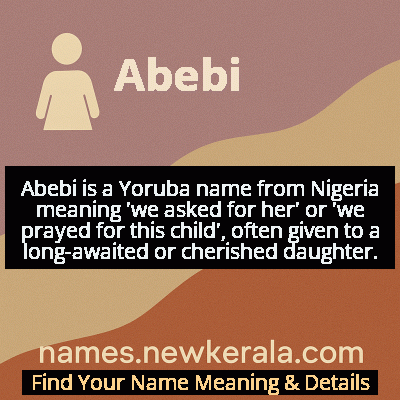Abebi Name Meaning & Details
Origin, Popularity, Numerology Analysis & Name Meaning of Abebi
Discover the origin, meaning, and cultural significance of the name ABEBI. Delve into its historical roots and explore the lasting impact it has had on communities and traditions.
Name
Abebi
Gender
Female
Origin
African
Lucky Number
1
Meaning of the Name - Abebi
Abebi is a Yoruba name from Nigeria meaning 'we asked for her' or 'we prayed for this child', often given to a long-awaited or cherished daughter.
Abebi - Complete Numerology Analysis
Your Numerology Number
Based on Pythagorean Numerology System
Ruling Planet
Sun
Positive Nature
Leaders, ambitious, highly driven, self-reliant, innovative.
Negative Traits
Overly aggressive, domineering, impatient, selfish.
Lucky Colours
Red, orange, gold.
Lucky Days
Sunday.
Lucky Stones
Ruby, garnet.
Harmony Numbers
2, 3, 9.
Best Suited Professions
Entrepreneurs, managers, engineers.
What People Like About You
Courage, determination, leadership.
Famous People Named Abebi
Abebi Ogun
Traditional Textile Artist
Renowned for preserving and modernizing Yoruba adire textile techniques, with works exhibited internationally
Abebi Adebayo
Educator and Community Leader
Founded multiple literacy programs for women in rural Yoruba communities, impacting thousands of lives
Abebi Lawal
Cultural Anthropologist
Published groundbreaking research on Yoruba naming traditions and their sociological significance
Name Variations & International Equivalents
Click on blue names to explore their detailed meanings. Gray names with will be available soon.
Cultural & Historical Significance
The naming ceremony (ìsọmọlórúkọ) for an Abebi is particularly celebratory, marking the arrival of a much-anticipated child who completes the family unit. Historically, such names reinforced the importance of lineage continuation and the belief that children are gifts from Olodumare (the Supreme Being) and ancestral spirits. In modern contexts, the name continues to symbolize hope, answered prayers, and the preciousness of female children in Yoruba families, serving as a cultural anchor that connects contemporary generations to ancestral traditions and values.
Extended Personality Analysis
Individuals named Abebi are often perceived as cherished blessings within their communities, which shapes their personality development significantly. They typically exhibit strong nurturing qualities, emotional intelligence, and a deep sense of responsibility toward family and community welfare. Having grown up knowing they were eagerly awaited, many Abebis develop confident, purposeful personalities with natural leadership tendencies. Their upbringing often emphasizes their special status, resulting in individuals who are both humble about their position yet driven to fulfill the high expectations placed upon them.
Psychologically, the knowledge of being a 'prayer answered' can instill remarkable resilience and optimism. Abebis are frequently described as diplomatic peacemakers, drawing from their inherent understanding of their role as unifiers within their social circles. They tend to be excellent communicators, patient listeners, and natural caregivers—qualities that make them excel in professions involving teaching, counseling, healthcare, and community organization. Their presence often brings calm and resolution to tense situations, reflecting the peaceful arrival their name signifies, while their inherent sense of purpose drives them to make meaningful contributions in whatever fields they choose to pursue.
Modern Usage & Popularity
In contemporary times, Abebi maintains strong cultural relevance while adapting to global contexts. Among Yoruba diaspora communities in the United Kingdom, United States, and Canada, the name has seen increased usage as second and third-generation immigrants seek to preserve cultural identity. Social media platforms and global connectivity have introduced Abebi to wider audiences, with many non-Yoruba parents choosing the name for its beautiful meaning and melodic sound. According to Nigerian birth registration data, Abebi remains consistently popular in southwestern Nigeria, though it faces competition from more modern invented names. The name has gained particular traction among educated, urban families who value cultural heritage while embracing contemporary lifestyles. Recent years have seen a resurgence in traditional Yoruba names as cultural pride movements grow, positioning Abebi as both timeless and fashionable. Its usage in professional spheres has expanded significantly, with many Abebis achieving prominence in business, academia, and the arts, demonstrating how traditional names can thrive in modern global contexts.
Symbolic & Spiritual Meanings
Beyond its literal translation, Abebi carries rich symbolic meanings that resonate across multiple dimensions of human experience. The name symbolizes divine timing and the manifestation of deeply held desires, representing the intersection between human aspiration and spiritual fulfillment. Metaphorically, Abebi embodies the concept of 'divine alignment'—the idea that some arrivals in our lives are predestined and perfectly timed. In philosophical contexts, the name has been used to represent hope persevering through adversity, much like a seed that finally blossoms after long dormancy. The 'asking and receiving' dynamic inherent in the name's meaning speaks to universal human experiences of prayer, patience, and gratitude. Symbolically, Abebi represents the feminine principle of receptive creation—the space that welcomes and nurtures what has been longed for. In artistic representations, Abebi is often associated with images of morning dew on new leaves, representing freshness, purity, and the beginning of something precious. The name continues to inspire as a symbol of answered prayers across cultural boundaries, reminding us of the power of faith and the beauty of fulfilled expectations in human experience.

